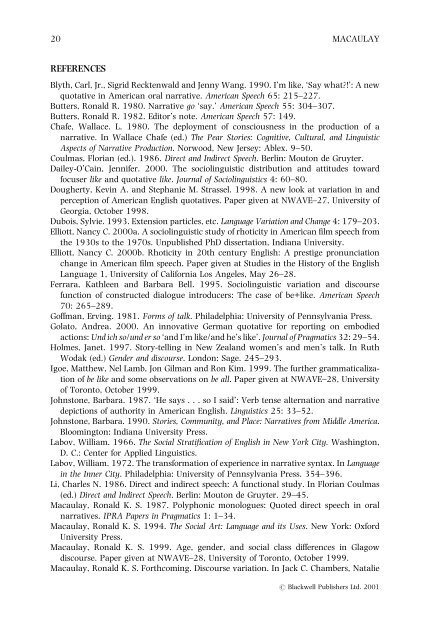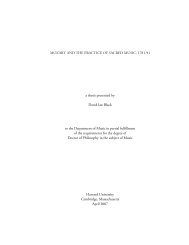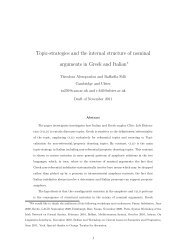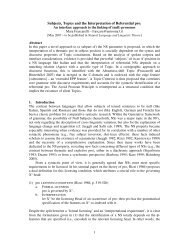You're like `why not?' The quotative expressions of Glasgow ...
You're like `why not?' The quotative expressions of Glasgow ...
You're like `why not?' The quotative expressions of Glasgow ...
Create successful ePaper yourself
Turn your PDF publications into a flip-book with our unique Google optimized e-Paper software.
20<br />
REFERENCES<br />
MACAULAY<br />
Blyth, Carl, Jr., Sigrid Recktenwald and Jenny Wang. 1990. I'm <strong>like</strong>, `Say what?!': A new<br />
<strong>quotative</strong> in American oral narrative. American Speech 65: 215±227.<br />
Butters, Ronald R. 1980. Narrative go `say.' American Speech 55: 304±307.<br />
Butters, Ronald R. 1982. Editor's <strong>not</strong>e. American Speech 57: 149.<br />
Chafe, Wallace. L. 1980. <strong>The</strong> deployment <strong>of</strong> consciousness in the production <strong>of</strong> a<br />
narrative. In Wallace Chafe ed.) <strong>The</strong> Pear Stories: Cognitive, Cultural, and Linguistic<br />
Aspects <strong>of</strong> Narrative Production. Norwood, New Jersey: Ablex. 9±50.<br />
Coulmas, Florian ed.). 1986. Direct and Indirect Speech. Berlin: Mouton de Gruyter.<br />
Dailey-O'Cain, Jennifer. 2000. <strong>The</strong> sociolinguistic distribution and attitudes toward<br />
focuser <strong>like</strong> and <strong>quotative</strong> <strong>like</strong>. Journal <strong>of</strong> Sociolinguistics 4: 60±80.<br />
Dougherty, Kevin A. and Stephanie M. Strassel. 1998. A new look at variation in and<br />
perception <strong>of</strong> American English <strong>quotative</strong>s. Paper given at NWAVE±27, University <strong>of</strong><br />
Georgia, October 1998.<br />
Dubois, Sylvie. 1993. Extension particles, etc. Language Variation and Change 4: 179±203.<br />
Elliott, Nancy C. 2000a. A sociolinguistic study <strong>of</strong> rhoticity in American ®lm speech from<br />
the 1930s to the 1970s. Unpublished PhD dissertation, Indiana University.<br />
Elliott, Nancy C. 2000b. Rhoticity in 20th century English: A prestige pronunciation<br />
change in American ®lm speech. Paper given at Studies in the History <strong>of</strong> the English<br />
Language 1, University <strong>of</strong> California Los Angeles, May 26±28.<br />
Ferrara, Kathleen and Barbara Bell. 1995. Sociolinguistic variation and discourse<br />
function <strong>of</strong> constructed dialogue introducers: <strong>The</strong> case <strong>of</strong> be+<strong>like</strong>. American Speech<br />
70: 265±289.<br />
Go€man, Erving. 1981. Forms <strong>of</strong> talk. Philadelphia: University <strong>of</strong> Pennsylvania Press.<br />
Golato, Andrea. 2000. An innovative German <strong>quotative</strong> for reporting on embodied<br />
actions: Und ich so/und er so `and I'm <strong>like</strong>/and he's <strong>like</strong>'. Journal <strong>of</strong> Pragmatics 32: 29±54.<br />
Holmes, Janet. 1997. Story-telling in New Zealand women's and men's talk. In Ruth<br />
Wodak ed.) Gender and discourse. London: Sage. 245±293.<br />
Igoe, Matthew, Nel Lamb, Jon Gilman and Ron Kim. 1999. <strong>The</strong> further grammaticalization<br />
<strong>of</strong> be <strong>like</strong> and some observations on be all. Paper given at NWAVE±28, University<br />
<strong>of</strong> Toronto, October 1999.<br />
Johnstone, Barbara. 1987. `He says . . . so I said': Verb tense alternation and narrative<br />
depictions <strong>of</strong> authority in American English. Linguistics 25: 33±52.<br />
Johnstone, Barbara. 1990. Stories, Community, and Place: Narratives from Middle America.<br />
Bloomington: Indiana University Press.<br />
Labov, William. 1966. <strong>The</strong> Social Strati®cation <strong>of</strong> English in New York City. Washington,<br />
D. C.: Center for Applied Linguistics.<br />
Labov, William. 1972. <strong>The</strong> transformation <strong>of</strong> experience in narrative syntax. In Language<br />
in the Inner City. Philadelphia: University <strong>of</strong> Pennsylvania Press. 354±396.<br />
Li, Charles N. 1986. Direct and indirect speech: A functional study. In Florian Coulmas<br />
ed.) Direct and Indirect Speech. Berlin: Mouton de Gruyter. 29±45.<br />
Macaulay, Ronald K. S. 1987. Polyphonic monologues: Quoted direct speech in oral<br />
narratives. IPRA Papers in Pragmatics 1: 1±34.<br />
Macaulay, Ronald K. S. 1994. <strong>The</strong> Social Art: Language and its Uses. New York: Oxford<br />
University Press.<br />
Macaulay, Ronald K. S. 1999. Age, gender, and social class di€erences in Glagow<br />
discourse. Paper given at NWAVE±28, University <strong>of</strong> Toronto, October 1999.<br />
Macaulay, Ronald K. S. Forthcoming. Discourse variation. In Jack C. Chambers, Natalie<br />
# Blackwell Publishers Ltd. 2001
















